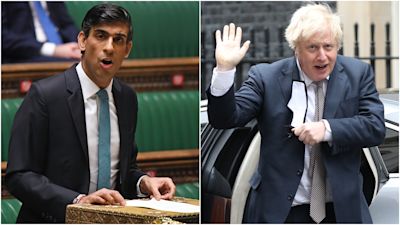Boris Johnson and Rishi Sunak face Tory backlash over cut to international aid

Boris Johnson is facing a growing Tory backlash over plans to cut the international aid budget as part of a sweeping Spending Review aimed at dealing with the economic impact of the coronavirus crisis.
A number of prominent Conservatives publicly expressed concern at the move – which formed part of the party’s manifesto – as the government’s economic forecasts were questioned by some economists.
The overseas aid cut was announced by Chancellor Rishi Sunak as one of a number of measures intended to help cope with the economy contracting by an expected 11.3% this year.
The prime minister and Mr Sunak addressed a virtual meeting of the 1922 Committee of Tory backbench MPs on Wednesday night to try and firm up support for their approach.
Former foreign secretary Jeremy Hunt and ex-prime minister David Cameron, were among those criticising the plans to cut overseas aid from 0.7% to 0.5% of gross national income (GNI).
"It's a very sad moment," Mr Cameron said when asked for his thoughts on the chancellor's move to cut foreign aid.
He added: "We're breaking a promise to the poorest people and the poorest countries in the world - a promise that we made and a promise that we don't have to break."
The chancellor defended what he said was one of the "difficult choices" he had to make in the Spending Review," in order to make sure that i could keep investing in the priorities that British people have".
Foreign Secretary Dominic Raab told MPs in the Commons that the government would legislate to allow it to abandon the 0.7% commitment, but insisted the UK was still determined to lead the world in international aid.
He said "record levels of borrowing and debt" meant he did not think he could "justify sticking rigidly to the 0.7%".
The GNI in 2019 was £2.17 trillion, meaning a drop from 0.7% to 0.5% would account for more than £4 billion.
It prompted Foreign Office minister Baroness Sugg to quit in protest and, in her resignation letter to Mr Johnson, she called it the “fundamentally wrong” move, telling the Prime Minister it would “diminish our power to influence other nations to do what is right”.
Other Tories critical of the move included former international development secretary Andrew Mitchell and chairman of the Commons defence committee Tobias Ellwood.
Archbishop of Canterbury Justin Welby said it was “shameful and wrong” while Mr Mitchell said it would be “the cause of 100,000 preventable deaths, mainly among children”.
Mr Ellwood warned China and Russia are likely to extend their “authoritarian influence” as a result of the “vacuum” created by the UK “downgrading” its soft power programmes.
Mr Sunak said the 0.5% equated to around £10 billion in aid and defended the cut, adding: “Sticking rigidly to spending 0.7% of our national income on overseas aid is difficult to justify to the British people, especially when we’re seeing the highest peacetime levels of borrowing on record.”
The Chancellor earlier said the economy was not scheduled to recover to pre-crisis levels until the end of 2022.
Emergency measures will see the government borrow £394 billion this year, which amounts to 19% of Gross Domestic Product (GDP), a measure of the size of the economy – the highest ever recorded in peacetime.
However, head of the Institute for Fiscal Policy (IFS) Paul Johnson questioned whether even more borrowing than that signalled by the government would be needed.
He Tweeted: “SR (Spending Review) assumes zero spending on Covid after next year. It assumes Universal Credit is cut in April. It assumes non-Covid spending will be £10bn p.a. less than expected in March. Not sure any of these will happen. Implying quite a lot more borrowing even than the £100bn forecast.”
Mr Sunak said the government had to make firm decisions as Britain faced its biggest downturn for 300 years, with unemployment set to hit 2.6 million by the middle of 2021, according to official forecasts from the Office for Budget Responsibility (OBR).
The “long-term scarring” from the crisis means that in 2025 the economy will still be around 3% smaller than had been expected in March this year, Mr Sunak told MPs.
Mr Sunak also announced what amounted to a pay freeze for an estimated 1.3 million public sector workers.
NHS workers will be spared the “pause” in wage rises, and those earning below £24,000 will receive at least £250 extra.
The Chancellor said: “Our health emergency is not yet over. And our economic emergency has only just begun.”
Mr Sunak also used the statement to stress that £280 billion was being spent on the coronavirus response this year.
He said that next year some £55 billion was being targeted at public services dealing with the crisis, including an initial £18 billion for testing, personal protective equipment and vaccines.
The Chancellor also promised extra help as part of the Government’s “levelling up” agenda, with a new £4 billion fund available for projects across the country which have support of local communities and politicians.
Shadow chancellor Anneliese Dodds condemned the pay freeze for public sector workers and claimed the Spending Review “takes a sledgehammer to consumer confidence”.